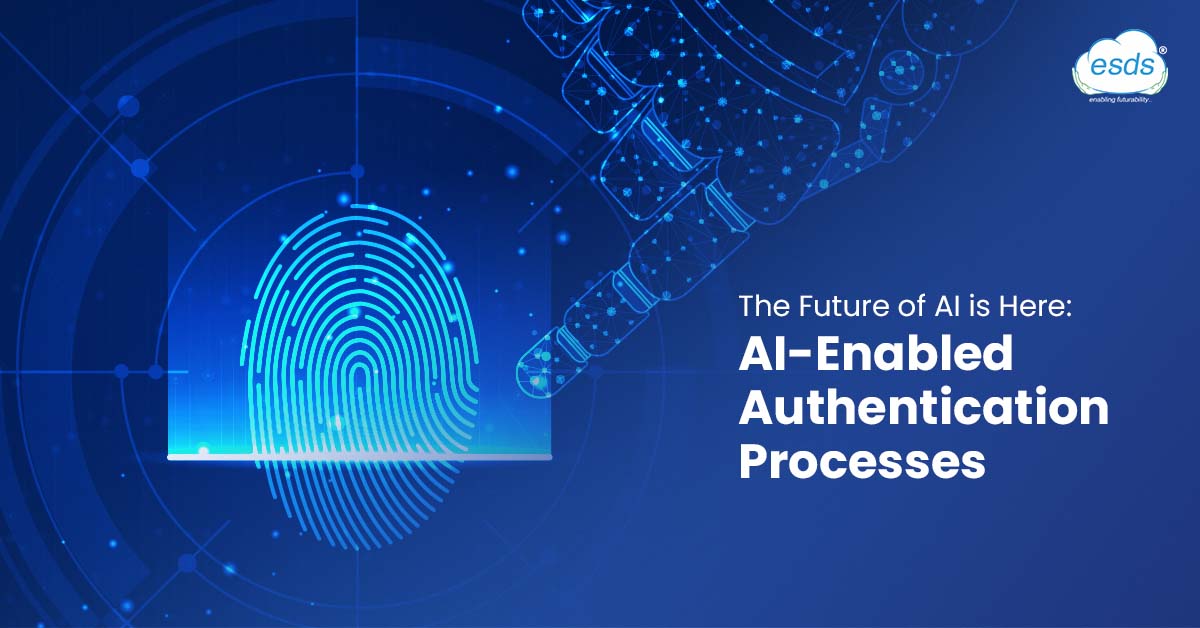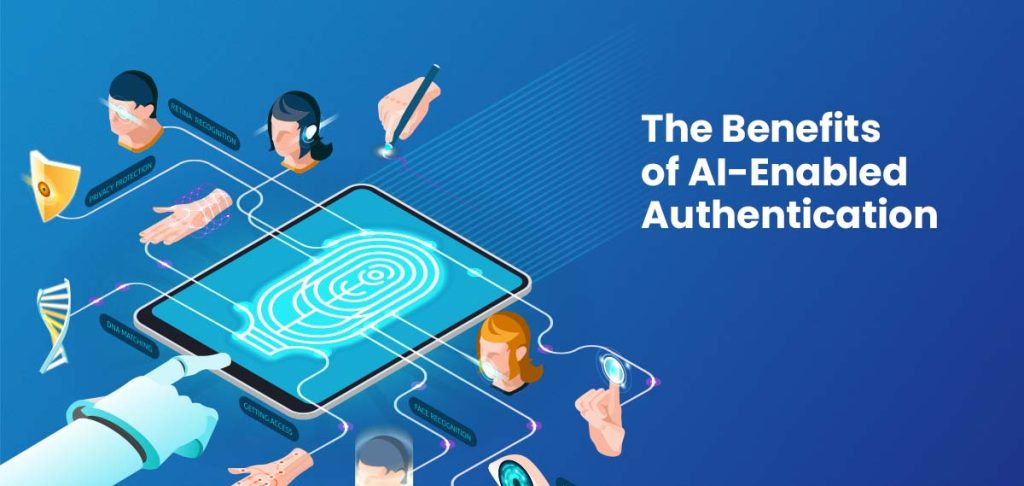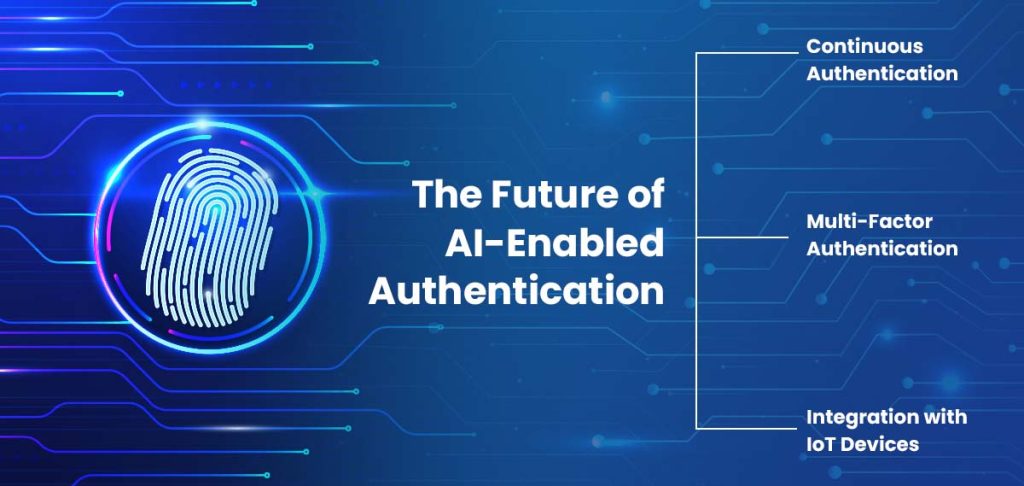The Future of AI is here: AI-Enabled Authentication Processes

Secure and efficient authentication processes have become more crucial in today’s digital age as the hacking rate has increased drastically. Traditional methods such as passwords and PINs are no longer sufficient to protect sensitive information from cyber threats. As a result, integrating artificial intelligence (AI) in authentication processes has gained significant attention. AI-enabled authentication offers a promising solution to enhance security, streamline user experiences, and adapt to evolving threats.
This blog post explores the future of AI-enabled authentication processes and their potential benefits to individuals and organizations.
The Benefits of AI-Enabled Authentication

- AI for Anomaly Detection: AI algorithms can analyze vast amounts of data and detect patterns and anomalies that might indicate security breaches. According to a survey, AI can improve threat detection rates by up to 50%.
- Continuous Learning: Machine learning algorithms can continuously learn and adapt to new threats. For instance, AI-driven behavioral analytics can help organizations detect unusual user behavior, such as unique login times or locations.
- Biometric Authentication: Biometric authentication, powered by AI, offers higher security. Facial recognition, for example, has become increasingly accurate, with Apple’s Face ID boasting a one-in-a-million chance of a false match.
Improved User Experience
- AI-enabled authentication: AI-enabled authentication processes can eliminate the need for complex passwords and PINs, making accessing their accounts more accessible.
- Voice recognition and facial recognition: Voice recognition and facial recognition technologies offer a more convenient and seamless user experience, reducing the friction associated with traditional authentication methods.
- AI algorithms: AI algorithms can analyze user behavior patterns to provide personalized and adaptive authentication, ensuring a smooth and efficient user journey.
Challenges and Considerations

Privacy Concerns
- Using biometric data for authentication raises privacy concerns, as it involves capturing and storing sensitive personal information.
- Organizations must implement robust security measures to protect biometric data from unauthorized access or misuse.
Ethical Implications
- Humans must train AI algorithms used in authentication processes on diverse and representative datasets to avoid biases and discrimination.
- Transparency and accountability in AI-enabled authentication systems are crucial to ensure fairness and prevent potential misuse.
The Future of AI-Enabled Authentication

Continuous Authentication
Traditional authentication methods, such as passwords and PINs, have long been vulnerable to breaches and hacking attempts. Continuous authentication is the solution to this age-old problem. Instead of relying on a one-time login, continuous authentication constantly verifies the user’s identity throughout their session. This is achieved through a combination of behavioral biometrics and machine learning algorithms.
Continuous authentication observes how users interact with their device – their typing speed, mouse movements, and even facial expressions if they have a camera. By analyzing these patterns, AI can determine if the user is indeed a legitimate account holder or if there’s a security threat. This seamless and unobtrusive approach to authentication is set to become the standard shortly, ensuring that your online accounts remain safe, even if your password is compromised.
Multi-Factor Authentication
While multi-factor authentication (MFA) is not a new concept, AI enhances its effectiveness and user-friendliness. MFA combines two or more verification methods to grant access to an account. Traditionally, this might involve something you know (password), something you have (smartphone), and something you are (fingerprint). AI adds an extra layer of intelligence to MFA.
With AI, MFA systems can adapt and assess the risk level of each authentication attempt. For instance, if you’re logging in from a familiar device and location, the AI may streamline the process by requiring only a single factor. However, if the system detects unusual behavior, it can prompt additional verification steps to ensure security.
Integration with IoT Devices
The Internet of Things (IoT) has rapidly transformed how we interact with our surroundings. Smart devices are now commonplace in our homes, offices, and clothing. As the IoT ecosystem grows, so do the associated security concerns. This is where AI-enabled authentication steps in.
AI can seamlessly integrate with IoT devices to provide a secure and convenient user experience. Imagine your smart home system recognizing your voice and adjusting settings accordingly or your wearable device monitoring your health data and ensuring only authorized access. AI enhances security and simplifies how we interact with the ever-expanding world of IoT.
Conclusion
As technology advances, AI-enabled authentication processes offer a promising future for secure and efficient identification. By leveraging the power of AI algorithms, organizations can enhance security, improve user experiences, and adapt to evolving threats. However, addressing privacy concerns and ethical implications and ensuring transparency in developing and implementing AI-enabled authentication systems is crucial. The future is here, and AI is revolutionizing how we authenticate ourselves digitally.
- Decoding Generative AI: A Comprehensive Guide to Gartner’s Impact Radar - January 2, 2024
- 5 Best Practices for Cloud Security in 2024 - December 29, 2023
- 10 Best Machine Learning Ops Strategies for Cloud Environments in 2024 - December 29, 2023
